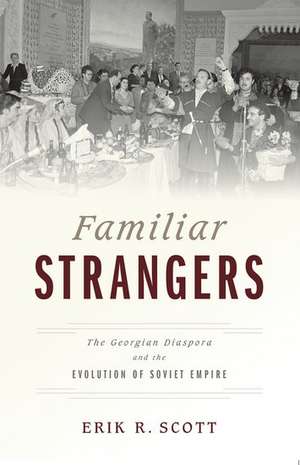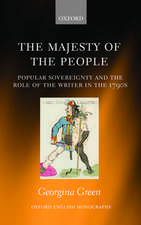Familiar Strangers: The Georgian Diaspora and the Evolution of Soviet Empire
Autor Erik R. Scotten Limba Engleză Paperback – 14 sep 2017
| Toate formatele și edițiile | Preț | Express |
|---|---|---|
| Paperback (1) | 298.55 lei 31-37 zile | |
| Oxford University Press – 14 sep 2017 | 298.55 lei 31-37 zile | |
| Hardback (1) | 594.72 lei 31-37 zile | |
| Oxford University Press – 21 apr 2016 | 594.72 lei 31-37 zile |
Preț: 298.55 lei
Preț vechi: 337.27 lei
-11% Nou
Puncte Express: 448
Preț estimativ în valută:
57.13€ • 62.25$ • 48.14£
57.13€ • 62.25$ • 48.14£
Carte tipărită la comandă
Livrare economică 12-18 aprilie
Preluare comenzi: 021 569.72.76
Specificații
ISBN-13: 9780190695774
ISBN-10: 0190695773
Pagini: 354
Ilustrații: 20 illus.
Dimensiuni: 156 x 234 x 20 mm
Greutate: 0.54 kg
Editura: Oxford University Press
Colecția OUP USA
Locul publicării:New York, United States
ISBN-10: 0190695773
Pagini: 354
Ilustrații: 20 illus.
Dimensiuni: 156 x 234 x 20 mm
Greutate: 0.54 kg
Editura: Oxford University Press
Colecția OUP USA
Locul publicării:New York, United States
Recenzii
Written in an accessible style and based on an impressive documentary base, Familiar Strangers is a respectable summary of the position of the internal Georgian diaspora from the Stalin era to the end of the Soviet Union.
This is an intriguing study of the role Georgians--whether prominent Bolsheviks, restaurateurs, musicians, film directors, or black-market entrepreneurs--played in the politics, economy, and culture of the Soviet Union... [A] well-researched and annotated book...
Unlike most works Scott takes an unfamiliar approach. He has chosen to focus on a minority group through the lens of diaspora community within the USSR. This approach allows Scott to reveal the larger and often overlooked interactions between ethnic and imperial networks and uncover the mutual benefits derived by the minority and the empire.
Illustrates how the Soviet state shaped the modern national culture of Georgia, generously providing the resources, structures, and ideological supports for a Soviet-national hybrid consisting of a rich blend of Soviet and Georgian cultures This is a welcome and innovative book; it is well written and well researched.
Drawing on an impressive range of archival, periodical and secondary sources in both Russian and Georgian, as well as numerous interviews in Russia and in Georgia, Familiar Strangers is an important contribution to the study of Soviet history, political and cultural, and despite -- or perhaps, because of -- its focus on the concept of diaspora, it makes a strong contribution as well to recent Georgian historiography. Most importantly, in focusing on the ways in which national identity was exploited and 'performed' beyond the boundaries of specific national territories, it brings a new approach to generalising from the study of ethnicity in the Soviet experiment, and presents a powerful case study of the ways in which a particular nationality both shaped and was shaped by the empire of which it was a part.
This book makes an important contribution to the study of nationality in the Soviet Union ... Recommended.
Erik Scott's fascinating and groundbreaking study upends the conventional view that the Soviet Union's multiethnic empire possessed an ethnic Russian core, and reshapes how we understand national minorities in the USSR and the nature of the Soviet empire. The book is meticulously researched and beautifully written, with rich details and surprising material. His analysis calls to mind other cases of prominent minorities in revolution, such as the Alawites in Syria and the Sunni minority in Ba'athist Iraq. The book will be of great interest not only to students of Georgia, the Soviet Union, and Stalinism, but also to those interested in revolution and empire.
Familiar Strangers provocatively explores how internally mobile Soviet Georgians successfully performed their otherness for a pan-Soviet audience, without sacrificing the core of their difference. In a superb study that ranges from politics to cuisine to music to market trade to film, Scott challenges conventional notions of the 'Soviet empire,' showing how the view from the periphery provides a unique yardstick to measure the rise and fall of the Soviet project of domestic internationalism.
Familiar Strangers tells us that the Soviet Union made modern Georgia in two ways. First, it gave Georgians a mass of resources to promote and protect their language, food, and culture, in ways that few other modern states would have countenanced. Second, it gave them an enormous space in which to project an identity and participate in global geopolitics. From Stalin to the Moscow restaurant table, from the folkloric stage to the black market, and from the heights of Soviet politics to the center of its break-up, Scott gives us revealing snapshots of one of the country's great internal diasporas. Those seeking a thoughtful and accessible history of Georgians and the question of nationality in the USSR will be deeply satisfied.
A finely tuned study of Georgians in the Soviet landscape. Scott makes the case for how Georgians became 'familiar strangers,' the most legible among non-Russian peoples across the spectrum of Soviet life given their prominent place in politics, market stalls, on the theater stage, and perhaps most enduringly, at restaurant tables ... [an] excellent book
Scott argues that the experience of Georgians who have made their way in Russia reveals the Soviet empire's uniquely multiethnic quality. Rather than think of the Soviet Union as a checkerboard of territorial units with Russia at its core, one could better understand it as 'an empire of mobile diasporas that ... helped construct a truly multiethnic society.
This is a readable book that is in no way only about Georgians, but powerfully illuminates how internal diasporas, understood implicitly as parts of cultures of circulation in which ethnicity can circulate both embodied in persons as well as things, were crucial in the formation of the peculiar multi-ethnic empire of the Soviet Union.
This is an intriguing study of the role Georgians--whether prominent Bolsheviks, restaurateurs, musicians, film directors, or black-market entrepreneurs--played in the politics, economy, and culture of the Soviet Union... [A] well-researched and annotated book...
Unlike most works Scott takes an unfamiliar approach. He has chosen to focus on a minority group through the lens of diaspora community within the USSR. This approach allows Scott to reveal the larger and often overlooked interactions between ethnic and imperial networks and uncover the mutual benefits derived by the minority and the empire.
Illustrates how the Soviet state shaped the modern national culture of Georgia, generously providing the resources, structures, and ideological supports for a Soviet-national hybrid consisting of a rich blend of Soviet and Georgian cultures This is a welcome and innovative book; it is well written and well researched.
Drawing on an impressive range of archival, periodical and secondary sources in both Russian and Georgian, as well as numerous interviews in Russia and in Georgia, Familiar Strangers is an important contribution to the study of Soviet history, political and cultural, and despite -- or perhaps, because of -- its focus on the concept of diaspora, it makes a strong contribution as well to recent Georgian historiography. Most importantly, in focusing on the ways in which national identity was exploited and 'performed' beyond the boundaries of specific national territories, it brings a new approach to generalising from the study of ethnicity in the Soviet experiment, and presents a powerful case study of the ways in which a particular nationality both shaped and was shaped by the empire of which it was a part.
This book makes an important contribution to the study of nationality in the Soviet Union ... Recommended.
Erik Scott's fascinating and groundbreaking study upends the conventional view that the Soviet Union's multiethnic empire possessed an ethnic Russian core, and reshapes how we understand national minorities in the USSR and the nature of the Soviet empire. The book is meticulously researched and beautifully written, with rich details and surprising material. His analysis calls to mind other cases of prominent minorities in revolution, such as the Alawites in Syria and the Sunni minority in Ba'athist Iraq. The book will be of great interest not only to students of Georgia, the Soviet Union, and Stalinism, but also to those interested in revolution and empire.
Familiar Strangers provocatively explores how internally mobile Soviet Georgians successfully performed their otherness for a pan-Soviet audience, without sacrificing the core of their difference. In a superb study that ranges from politics to cuisine to music to market trade to film, Scott challenges conventional notions of the 'Soviet empire,' showing how the view from the periphery provides a unique yardstick to measure the rise and fall of the Soviet project of domestic internationalism.
Familiar Strangers tells us that the Soviet Union made modern Georgia in two ways. First, it gave Georgians a mass of resources to promote and protect their language, food, and culture, in ways that few other modern states would have countenanced. Second, it gave them an enormous space in which to project an identity and participate in global geopolitics. From Stalin to the Moscow restaurant table, from the folkloric stage to the black market, and from the heights of Soviet politics to the center of its break-up, Scott gives us revealing snapshots of one of the country's great internal diasporas. Those seeking a thoughtful and accessible history of Georgians and the question of nationality in the USSR will be deeply satisfied.
A finely tuned study of Georgians in the Soviet landscape. Scott makes the case for how Georgians became 'familiar strangers,' the most legible among non-Russian peoples across the spectrum of Soviet life given their prominent place in politics, market stalls, on the theater stage, and perhaps most enduringly, at restaurant tables ... [an] excellent book
Scott argues that the experience of Georgians who have made their way in Russia reveals the Soviet empire's uniquely multiethnic quality. Rather than think of the Soviet Union as a checkerboard of territorial units with Russia at its core, one could better understand it as 'an empire of mobile diasporas that ... helped construct a truly multiethnic society.
This is a readable book that is in no way only about Georgians, but powerfully illuminates how internal diasporas, understood implicitly as parts of cultures of circulation in which ethnicity can circulate both embodied in persons as well as things, were crucial in the formation of the peculiar multi-ethnic empire of the Soviet Union.
Notă biografică
Erik R. Scott is an Assistant Professor of History at the University of Kansas.












